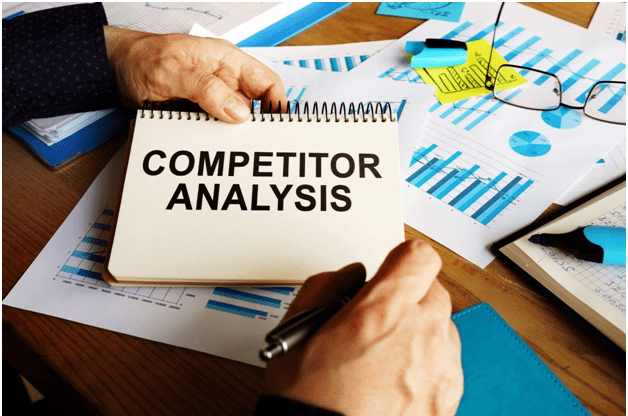Competitive analysis is the process of analyzing a business against its competitors in the market. When you first started your professional services firm, you performed a competitive analysis to determine your competitors. Or, if you are starting a new B2B business, the first question that comes to mind is who your competitors are. It is crucial to understand the market dynamics before creating a B2B business plan to sell your products or services.
This post is both for new B2B businesses who want to learn about competitive analysis and existing B2B businesses who want to learn how to perform the competitive analysis correctly.
We will discuss the following:
• what is competitive analysis?
• what a B2B competitive analysis can do for your firm
• how to do competitive research for marketing
• how business tools can help you to create your competitive analysis
• does your business need a B2B business consultant for competitive analysis?
What is competitive analysis?
Competitive analysis is the process of identifying a business’s competitors in the market and analyzing their service offerings, marketing strategies, operational strengths, substantive weaknesses, market dominance, and missed opportunities. It can be performed to serve many objectives depending on the purpose.
What can a B2B competitive analysis do for your firm?
Competitive analysis plays a critical role in the success and growth of a B2B firm. It critically assesses your competitor against your firm on a set of predetermined business criteria. Have a look at some of the purposes it serves.
Helps you identify competitors
If a professional service firm plans to enter into a new market or launch a new product line, a competitive analysis can help it understand the marketing dynamics. You need to conduct competitive research from scratch that includes various components such as determining the direct and indirect competitors, analyzing their product or services, evaluating their marketing strategies, etc.
Evaluate competitors’ product or service line
A professional services firm can also conduct competitor analysis to learn about the new products or services launched by the competitors. It helps you find new strategic opportunities to enhance your products or services and grow your business.
Competitors’ marketing strategies
Marketing competitive analysis can help you evaluate your competitors’ marketing strategies. This type of analysis is performed by the B2B businesses to identify the best practices and find out the growth opportunities in the market.
Identify strength and weakness
Competitive analysis is the detailed comparison of a company’s offerings, business strategy, and operational processes against its competitors. Each aspect is compared in detail based on the available information. Thus, a B2B firm can evaluate its strengths and weaknesses based on the comparison. There will be some areas such as features, pricing, service, quality, and support where your business surpasses your competitors and areas where your competitors outperform your firm.
Provide information to fill the gaps
The information collected from the competitive analysis can help you identify the gaps. It enables you to find out the services that are currently available to your target customer and the areas that are being neglected. C-level executives, decision-makers, and key influencers use this information to make the key strategic decisions to ensure business growth.
What Are the Key Components of Competitive Analysis for Marketing?
The main objective of the competitive analysis is to identify growth opportunities. Depending on the purpose of the competitive study, the components of competitive analysis differ. Here are the key elements of competitive analysis for marketing.
Determining the goal
The first step is to determine the goal of the competitor analysis. For example, do you want to perform the market analysis on a particular marketing platform, or do you want to research the entire marketing strategy? Based on the set goal, the approach to competitor analysis varies.
Data collection
Data collection is the most critical aspect of competitive analysis. It affects the accuracy and reliability of the competitive analysis. Various sources collect data, such as publicly available information, data selling companies, data tracking tools, and networking opportunities. It becomes easy to collect data when there is not much difference between your offering and your competitor’s offering. But sometimes, it gets complicated when not much of your competitor’s information is available.
Analysis
When data is combined with analytics, it provides sensible information used for SWOT and PEST analysis. Highly sophisticated industries such as professional services firms use dedicated frameworks to perform the competitor analysis.
Insights
Insights include developing executive summaries of the results for use by the senior team and the sales and marketing staff. It provides an honest opinion of how your market strategy is performing compared to your competitors. It includes both pros and cons.
For example, “In some cases, you may find that you are at a competitive disadvantage, in which case you may need to make a change to maintain your sales volumes,” said Josh Rovner, business consultant and bestselling author of Unbreak the System. “In other cases, you may notice that you have an advantage that could enable you to make a change that increases your sales or profit.”
Based on the insights, stakeholders and key decision-makers find ways to address concerns that make you lose valuable clients.
Feedback
Often, stakeholders require additional information to evaluate company strengths and weaknesses with one or more competitors. In that case, the marketing department may have to take the stakeholders’ feedback into account and design the strategy accordingly to find the information required for the stakeholders to make a well-informed decision. Again, this is not part of the competitive analysis but is often needed if additional information is required.
Company Expert B2B Competitive Analysis Playbook
A B2B Competitive Analysis Playbook can help you with the framework to create a customized competitive analysis. Company Expert has created a Competitive Analysis playbook that can provide you with examples and templates to develop your competitive assessment by completing the details. It walks you through a systematic approach to conducting a detailed evaluation of your industry and how you compare to some of your competitors. You will be able to develop executive summaries of the results for use by the senior team and the sales and marketing staff.
The Competitive Analysis Playbook will help you with the following:
• Determine the strengths and weaknesses of the competitors within your market
• Provide insights into the barriers to prevent competition from entering your market
• Inform strategies to provide you with a distinct advantage
• Assess a potential acquisition
• Highlight certain risks and provide critical information for your sales and marketing staff
Does Your B2B Firm Need a Business Consultant for Competitive Analysis?
A B2B firm will often create a customized template for competitive analysis with its marketing and sales resources using the playbook products. But sometimes, professional services firms that are new to the B2B industry may need the help of experienced B2B business consultants to craft a complete strategy for competitive analysis.
Company Expert can help you with a proprietary suite of solutions, business advisors, and B2B network to inject speed, knowledge, and accelerated growth into B2B Financial Services, Technology, and Professional Service Firms.



